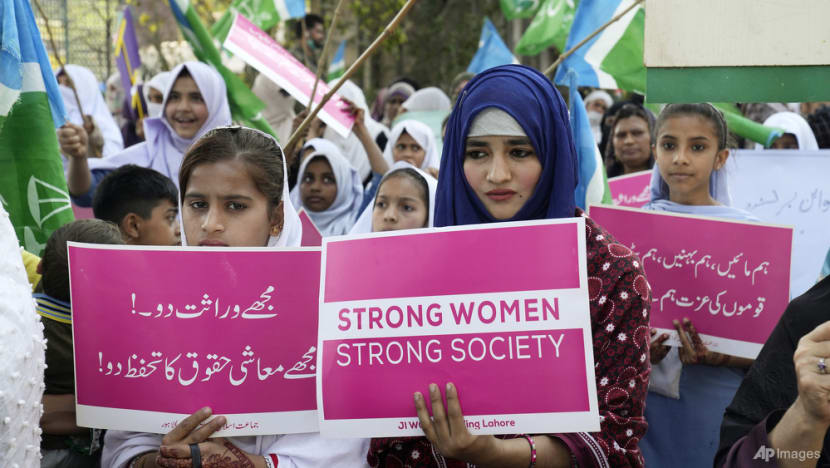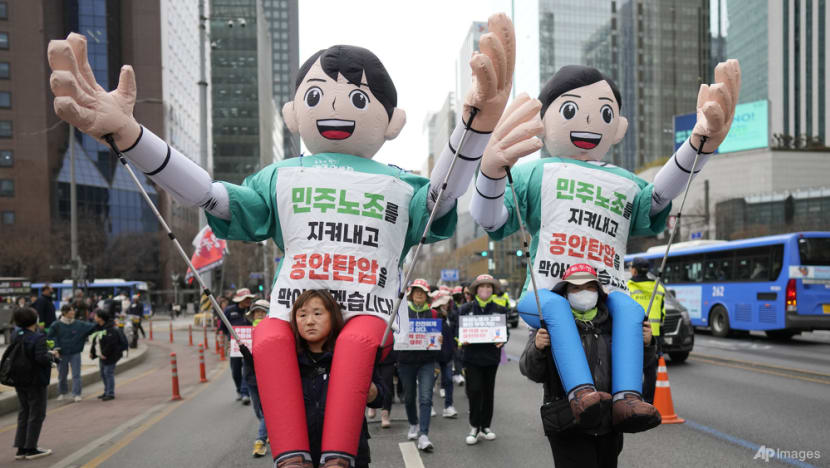Conflict and adversity affect women more, with heightened risks of violence and loss of rights: Experts
Women around the world face threats and obstacles both in public and at home, observers said, citing political prosecution, legal discrimination and domestic violence.

Girls participate in a rally organized by a religious party "Jamaat-e-Islami" to mark International Women's Day, in Lahore, Pakistan, Wednesday, March 8, 2023. The day officially recognized by the United Nations in 1977, is celebrated around the world on March 8. (AP Photo/K.M. Chaudary)
Women and girls are often disproportionately affected in crises and conflict, facing heightened risks of gender-based violence and lack of access to rights and resources, experts said on Wednesday (Mar 8).
International Women's Day is marked on March 8 yearly to celebrate the social, economic, cultural and political achievements of women, and also call for women’s rights and equality.
“Whenever there are crises, such as the pandemic, conflict, and even climate change, women bear the brunt of the struggles, there’s always a differential impact for them,” said Ms Dreeni Geer, global director of child rights, equality, and social justice at non-profit organisation Save the Children.
“Girls are the first ones pulled out of school. They are prevented from accessing all sorts of societal (amenities) such as education (and healthcare),” Ms Geer told CNA’s Asia First.
MORE AFFECTED IN CONFLICT ZONES
Globally, one in five adolescent girls live within a conflict zone, according to a study by Save the Children in October last year. They face increased levels of gender-based violence and the violation of their rights, compared to their male counterparts.
Girls affected by conflict are 20 per cent more at risk of child marriage compared to those living in peaceful areas, the research also showed.
Aid agency CARE International found that 150 million more women than men are going hungry worldwide, with the gap more prominent in conflict areas.
They were also found to be three times more likely to report stress and mental health issues.
“In a crisis, women and girls experience differently to men and boys based on underlying inequalities, and access to rights and resources,” said Ms Athena Nguyen, senior manager of the agency’s capability and impact unit.
“Women's health is more affected due to increased burdens, limited livelihood opportunities, gender-based violence and negative coping strategies,” she said.
Even in humanitarian responses, women’s rights are often overlooked, said Ms Geer, adding that less funds and attention are given towards tackling gender-based violence compared to other issues.
THREATS IN PUBLIC AND AT HOME
Women around the world face threats and obstacles both in public and at home, observers said, citing political prosecution, legal discrimination and domestic violence.
In Iran, hundreds of schoolgirls in more than 50 schools have suffered from suspected poisoning in recent months.
Some have suggested the girls could have been targeted by hardline groups opposed to girls' education.
Advocates said the Iranian government’s track record of failing to tackle crimes against women have put in doubt the authorities’ willingness to protect its female citizens.
“It is difficult to trust what the regime says,” said Dr Nina Ansary, director of the Women's Leadership Initiative at the University of Cambridge’s Middle East and North Africa Forum.
“The regime has never taken responsibility for its crimes against humanity, and for the incidents of, and since, the death of Mahsa Amini,” she added.
Dr Ansary was referring to the death in police custody of 22-year-old Mahsa Amini last September, following her arrest by the nation's morality police for not wearing a hijab.
Her death triggered nationwide protests met by violent government crackdowns, leading to dozens of protestors – many female – killed, beaten or arrested by security forces.
In Afghanistan, the rights and freedoms of women in the country have plummeted since the Taliban took power in 2021.
Girls have been banned from schools and universities. Employment for women has dropped by 25 per cent, the International Labor Organization said on Tuesday, with curbs and restrictions leaving many unable to go to work.
The United Nations (UN) on Wednesday said the women in Afghanistan are the "most repressed in the world".
Femicide – women killed because of their gender – numbers have remained largely unchanged over the past decade, UN figures showed. Asia had the highest number of femicides at the hands of relatives in 2021, while women in Africa were most at risk of being killed at home.
PROGRESS ON RIGHTS WORSENING
UN secretary-general Antonio Guterres warned on Monday that progress on women’s rights has been deteriorating and gender equality will not be achieved for another 300 years on the current track.
He cited violence against women, workforce inequality and maternal mortality as the top threats to gender equality, and stressed the need for change.
The COVID-19 pandemic has been the most recent huge-scale phenomenon setting back gender rights and erasing years of improvement, said Ms Geer.
Women are underrepresented across all levels of society, she added.
“From classrooms to courtrooms to the judiciary, as we move upwards through society, we see less and less women and girls represented,” said Ms Geer.

She called for an “all society investment and approach to tackle” gender inequality, starting from a young age.
Advocates said that education and participation are key to empowering women and ensuring that they do not get left behind. In particular, to lessen the suffering of women in conflict zones, fellow females can take on decision-making roles in humanitarian responses to crises.
“Women are often left out of decision-making processes, which means that sometimes those responses may not have taken into account the specific needs of women,” said Ms Nguyen.
“We are focused on working with local women and communities to ensure that women are able to participate in, and lead the responses to humanitarian crises themselves.”


















